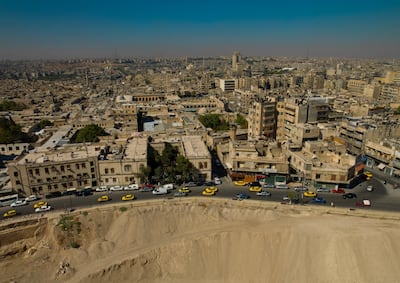More than four years after the Syrian government retook the rebel-held eastern half of Aleppo city, the area remains in ruins, largely deserted and lacking in state services.
The neglect, say those who still live there, is a form of collective punishment by the state in what was once the rebels’ most powerful stronghold.
Opposition forces seized the eastern half of Syria’s commercial hub in 2012, a year into the uprising against Bashar Al Assad. They left only in December 2016, after a prolonged siege and months of brutal bombardment by Syrian and allied Russian forces.
Along with the fighters and their families, thousands of ordinary civilians were evacuated, under a deal that allowed them to travel in safety to opposition-held territory in northern Syria.
"You can barely see people in most of this part of the city. Why would they come back?” said Abo-Ali, 36, a resident of Al Mashhad district who supports his family by working at a small coffee shop.
“Electricity comes a maximum of an hour per day, food is expensive and our income hardly covers our needs," he said.
"If it were not for my brother outside Syria who is sending me money, I would have probably become homeless with my family."

The final months of the government offensive took a heavy toll on infrastructure and residents in eastern Aleppo.
Hospitals, bakeries and schools were systematically targeted, with people displaced from their homes as residential areas were bombed or became front lines in the battle.
While the government-held western half of Aleppo also suffered damage in the fighting, there is a marked difference in the quality of services there now, said Ahmad, 41, an electrician who gave only his first name.
He moved to the Hamdaniya area of eastern Aleppo in 2012 after his home in the Al Sha'ar district was destroyed.
If piped water is available once a week in the west, it is available only once a month in the east, leaving people dependent on wells, Ahmad said.
Ahmad, east Aleppo resident
"There is a sheer inequality of services and reconstruction. The only rebuilding in the east is limited to the historical sites such as mosques and ancient markets; restoring services is utterly neglected," he said.
"The government only provided cleaning trucks for certain areas following the fall of east Aleppo, for media consumption. This was to show how the rebuilding had begun, and Aleppo would be better under its control, yet nothing so far has proved such claims.”

In both east and west Aleppo, as in much of Syria, queuing for hours has become the norm to obtain essentials such as cooking gas, petrol and subsidised bread.
"Waiting in long queues for bread, fuel, cooking gas and other essentials is a full-time job for everyone in the city, or at least one family member," Ahmad said.
Backed by the Russian military and Iranian proxy militias such as Hezbollah, Mr Al Assad's forces went on to reclaim most other rebel enclaves apart from the north-west province of Idlib.
However, the government is struggling to restore the war-battered economy in the face of international isolation and a steep depreciation of the Syrian currency. Potential donors are reluctant to fund reconstruction efforts in the absence of a political solution to the conflict.
Ali, a 39-year-old carpenter who gave only one name, returned to the city in January 2017 to find his home in Salah Al Deen neighbourhood, once on the front lines, destroyed.
Ali said rebuilding it would cost him millions of pounds.
"Even if I did fix it and moved back, this place is unliveable. The government has undertaken no programmes for rebuilding schools or services. Not just my neighbourhood – all but 5 per cent of the affected areas remain untouched.
"It’s like what happened in Hama in the aftermath of the 80s uprising [against Bashar Al Assad’s father, Hafez]; deliberately neglecting the city and providing the worst services and development projects,” Ali said.
“The east's future appears to be the same. We'll continue to pay the price of being held under the rebels' control."
Like other residents who spoke to The National, he asked for his real name to be withheld for fear of government reprisals.
Fear is also a factor in the reluctance of many former residents to return to east Aleppo despite amnesties announced for those who deserted the army or dodged conscription, or took part in anti-government actions.
Khaled Haj Abod, 37, who now lives in Idlib, said that even though he did not take part in any anti-government activities, he was scared to return to his home town.
"There is a high chance that Assad's intelligence could arrest me because I lived under opposition control. Once you disappear in the prisons, you are dead," he told The National.
"I would rather live free in displacement than go back to my home in Aleppo and live in terror of being arrested," he said.
"Whether inside regime areas or in northern Syria, the vast majority of us want to leave and go somewhere else to have a better life. Unfortunately, there is no future in this country."












